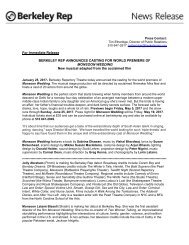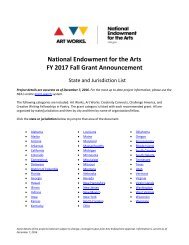BERKELEY
program-ic
program-ic
You also want an ePaper? Increase the reach of your titles
YUMPU automatically turns print PDFs into web optimized ePapers that Google loves.
PROLOGUE<br />
from the Managing Director<br />
Nonprofit theatres, as we know them today,<br />
began to emerge in communities across the country late in<br />
the 1950s and early ’60s. Among the values they shared was<br />
a passion to produce work, outside of New York, that spoke<br />
with urgency to issues of their times. Having established<br />
homes in cities as diverse as Cleveland, Dallas, Milwaukee,<br />
San Diego, and Oklahoma City, theatres set about reimagining<br />
classics to reflect the current political climate, and they<br />
produced new work that reflected the concerns of their day.<br />
Berkeley Rep and American Conservatory Theater were<br />
among the wave of theatres founded in the ’60s, spurred on by the establishment of<br />
the National Endowment for the Arts and a series of transformative grants from the<br />
Ford Foundation. Thanks to the GI Bill that minted a generation of college graduates<br />
and an economic explosion that provided some disposable income and leisure time,<br />
the environment was ripe for the kind of reflection and intellectual ambition that fed<br />
a cultural expansion from which we all benefit to this day.<br />
But the roots of the cultural riches that we enjoy today were inspired by the brief<br />
flowering of a national artistic sensibility that was fed by the remarkable social engineering<br />
experiment of the Work Projects Administration, the wpa, in the 1930s. And<br />
the concept of a theatre that speaks to issues of public concern, that tells stories that,<br />
while remarkable, may not always be commercially viable, morphed into what is now<br />
our national network of nonprofit theatres with homes in communities both large<br />
and small across this country. The hundreds of nonprofit regional theatres located<br />
nationwide are, truly, our national theatre.<br />
In 1935, when Sinclair Lewis wrote his terrifying It Can’t Happen Here, he was<br />
immediately asked to adapt it for the stage, and the production was licensed (for<br />
free) to theatres across the country. Within a year, the play had been translated into<br />
the languages of America’s expansive immigrant community and was produced in 21<br />
theatres in 17 states. It was a crazy and wonderful project.<br />
Not only have we, like Lewis, gone into overdrive to produce a new adaptation<br />
of It Can’t Happen Here, but with timely help from our friend, Rodgin Cohen, we have<br />
found partners across the country, in colleges and professional theatres, where on<br />
October 24, the play will be read in the large and small towns of America. We’ll be<br />
recreating that original “town hall” reading that was the brainchild of the wpa.<br />
Here we are today, so proud to have revived Lewis’ cautionary tale. And so proud<br />
to stand on the shoulders of all those theatres and artists who first produced this<br />
play under the aegis of the wpa’s Federal Theatre Project. And so proud to be part of<br />
a tradition that demands that we fully engage, and ask our audience to fully engage<br />
with us in one of the most urgent issues of our time.<br />
Proud to<br />
Support<br />
Berkeley Rep<br />
Personal attention<br />
thoughtful litigation<br />
final resolution<br />
Our goal is to preserve our<br />
client’s dignity and humanity.<br />
FA M I LY LAW G R OUP, P. C .<br />
575 Market Street, Suite 4000<br />
San Francisco, CA 94105<br />
415.834.1120<br />
www.sflg.com<br />
FAMILY LAW<br />
Warmly,<br />
Susan Medak<br />
2016–17 · ISSUE 1 · THE <strong>BERKELEY</strong> REP MAGAZINE · 7




